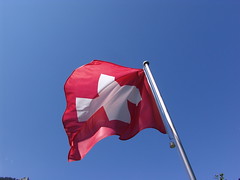 Image by twicepix via Flickr
Image by twicepix via FlickrBy Thomas Stephens
A motion to give legal recognition to people who are persecuted because of their sexual orientation has been roundly rejected by the House of Representatives.
The government argued that homosexuals were adequately protected by current asylum laws as members of a “particular social group”, reflecting the view of the United Nations Commission on Human Rights(UNHCR).
Wednesday’s defeat – by 125 votes to 64 – came a day after Amnesty International handed in a petition to the Federal Chancellery calling for the Swiss legal definition of “refugee” to be widened.
“We really regret that this has been rejected because it would have been a better solution for persecuted people,” Denise Graf, refugee coordinator at the human rights organisation’s Swiss section, told swissinfo.ch.
“Currently asylum law says authorities have to consider the special situation of women. We said they should have to consider the special situation of women and people who have been persecuted for their sexual orientation or sexual identity.”
Amnesty pointed out that homosexual acts are still illegal in 85 countries – predominantly Muslim and African ones, although also several parts of the United States – and punishable by death in Iran, Mauritania, Nigeria, Qatar, Saudi Arabia, Sudan and Yemen.
In many other parts of the world people sit in prison because of their actual or presumed sexuality, it added. Homosexuality was legalised in Switzerland in 1942.
Amnesty said that without legal recognition of this specific form of persecution, there was a danger that Switzerland would continue to turn away asylum seekers – even if they would then face prison, torture and death.
Graf said a few cases existed of people being granted asylum in Switzerland because of their sexual orientation, “but hardly any”.
“A study published in the specialist journal Asylum in 2007 said that between 1993 and 2005… out of 90 cases, four got asylum,” she said.
Increasing claims
The persecution of people because of their sexual orientation and gender identity is not a new phenomenon, the UNHCR noted in a report published in November 2008. But it acknowledged that only recently had a growing number of asylum claims been made by lesbian, gay, bisexual and transgender (LGBT) individuals.
The paper concluded that “international and national developments in sexual orientation case law clearly show that LGBT persons may be recognised as a ‘particular social group’ and, as such, are entitled to protection under the 1951 Convention”.
Non-governmental organisations have never been so vocal on this issue. In 2009, Human Rights Watch released a report entitled “They Want Us Exterminated; Murder, Torture, Sexual Orientation and Gender in Iraq”.
“Not enough awareness”
The cabinet had recommended that Wednesday’s motion, put forward by Green parliamentarian Katharina Prelicz-Huber, be rejected, arguing that the current laws were adequate.
“They say that the refugee definition covers the possibility to grant asylum for people who belong to a special social group. This is also the position of the UNHCR,” Graf said.
For example in February the government said it would admit two Guantanamo prisoners – Uighurs from the Chinese province of Xinjiang – on humanitarian grounds. Switzerland had already accepted one Guantanamo inmate, an Uzbek who arrived in January and is now residing in Geneva.
“But we believe there isn’t enough awareness inside the Migration Office or the appeal instance inside the Federal Administrative Court. We are convinced that introducing this explicitly into law would really result in more training and awareness about the situation of homosexuals,” she said.
Gay wave?
The centre-left Social Democratic Party was the only one of Switzerland’s four main parties to back the motion.
“To be able to live one’s sexual orientation free of danger is a fundamental part of personal freedom and therefore a justified reason for asylum,” said Margret Kiener Nellen, co-president of the party’s commission for sexual orientation and identity.
But Hans Fehr from the rightwing Swiss People’s Party feared there was “massive potential for abuse” as a result of a lack of controls.
“Hundreds of thousands of people could stream into the country and Switzerland would turn into an island of allegedly persecuted homosexuals,” he said.
“That’s ridiculous!” Graf told swissinfo.ch. “Every case is examined individually and this wouldn’t change if we amended the law. There was a change for women and we didn’t have hundreds and thousands of women looking for asylum in Switzerland.”
Legal struggle
But it’s not only states that persecute sexual minorities – many asylum seekers are often forced to flee by their families and communities.
Graf cited the example of Christian (not his real name), who had spent months in hiding in Cameroon after being arrested in a gay bar. He was hounded out of the country by his family and in 2005 was arrested at Zurich airport for having false papers. He applied for asylum in Switzerland – without disclosing he was gay – and was rejected.
It was only after he spoke to someone from the Swiss Red Cross that he admitted the real reason for his application. In April 2009, after a four-year legal struggle, he was granted asylum in Switzerland.

![Reblog this post [with Zemanta]](http://img.zemanta.com/reblog_e.png?x-id=1fe5448b-059c-40d5-9260-9931bc799529)






 Join our page
Join our page


0 comments:
Post a Comment